- Home
- Roy J. Snell
Don Hale with the Flying Squadron Page 6
Don Hale with the Flying Squadron Read online
Page 6
CHAPTER V--TRAINING
Americans, of course, enjoyed a great popularity all over France, and,therefore, Don and George were welcome guests at the shops, whichresembled huge manufacturing plants. They immediately found themselvessurrounded by another kind of activity. The din and hum of machinery,the clanging of hammers, the explosive reports of motors vibrated overthe air, all symbolizing, as it were, by means of sound, progress andlabor.
"They build airplanes here as well as repair them," explained George.
As the two walked from one point to another Don Hale marveled at what hesaw. The framework of hulls and of main planes, the latter with theirstrong but slender supporting spars, stood in long rows. Everywhereskilled artisans, ordinary mechanics, and helpers worked on variousparts of the planes. In the assemblage department Don and George stoppedto watch the winged creations, one of the latest products of man'sinventive genius, being put together. A foreman greeted them pleasantly.
"And what do the young Americans think of all this?" he inquired.
"Simply wonderful!" responded Don, enthusiastically.
"Very true!" agreed the men. "Ah! the art of airplane construction hasadvanced amazingly since the great world war began, mes Americaines. Itis now a very exact science, where the laws bearing upon lateral andlongitudinal balance, as well as many other things, have to berigorously observed."
"I believe that before 1914 the German equipment in the way of airplanesand dirigible balloons was greatly superior to either that of the Frenchor English," commented George.
"Yes, the Boches had been doing everything in their power to encouragethe development of both types of machines, while the other nations,unmindful of the peril which menaced them, were satisfied to let thecourse of events in that particular direction merely drift along."
"The Germans are said to have had, in addition to a fleet of hugeZeppelins, almost a thousand airplanes of the finest construction, whiletheir aeronautical factories were rushing work on others," put inGeorge. "France possessed only about three hundred machines and Englandstill less, probably as few as two hundred and fifty."
"The Germans at that time held the world's record for height andsustained flying," declared Don Hale.
"Correct," admitted the artisan. "They thought, too, that with thesupremacy of their navy of the air, the supremacy of Great Britain'sfleet on the sea could be more than overcome and England invaded.But"--the Frenchman clenched his fists--"our enemies--your enemies--theenemies of the entire world realize at last their error. They failed!They failed! The supremacy of the air now rests with the Allies."
"And yet, for a while, the Germans had the best scouting and fightingplanes," commented George.
"Yes; the Fokkers. But La France replied to that challenge byconstructing the famous Nieuport, the swiftest, the most easilymaneuvered airplane that flies. Come! Let me show you a sample."
Don and George, smiling a little at the tremendous earnestness exhibitedby the Frenchman, followed him to another part of the great shop, wherethe most skilled workers were putting the finishing touches to severalNieuports of the latest model. They were delicate but staunch littlemachines--their lines as graceful as those of any yacht; and each wasfinished with a degree of care and attention to detail which scarcelyseemed warranted when the perilous nature of the career they were sosoon to embark upon was considered.
"What perfect beauties!" cried Don. "Crickets, George! Don't I wish allmy training period were over, so that I could sail sky-high in one ofthese little rockets!"
"The speed of a rocket, Don, wouldn't do you very much good while flyingover the fighting front," replied his chum, rather grimly.
Don, too impatient, too restless to remain much longer indoors, soonstarted off with the other at his side. And all the while the obligingartisan kept imparting interesting bits of information. He told themsomething about the giant bi-motored Caudron, the Handley-Page and theCaproni, each type of machine representing the highest achievement inairplane building by the respective countries of France, England andItaly.
"The Boches," he added, with a scowl, "have the Gothas."
"I remember reading that some of the Gothas which bombed London had awing-spread of seventy-eight feet, with motors of two hundred and sixtyhorse power, and carried, besides three men, hundreds of pounds ofexplosives," remarked Don.
"Seventy-eight feet is nothing these days," commented the Frenchman,musingly. "A hundred and fifty is more like it. You and I, mesAmericaines, will live to see the time when huge flyers, withcomfortable accommodations for passengers, can cross the Atlantic,linking still closer the old world and the new."
Their volunteer guide now conducted the boys to another department,where they saw many women engaged in sewing together breadths of finelinen cloth destined to be stretched over the skeleton frames.
"Billions have been spent and are being expended in the airplaneindustry," continued the man. "Even piano and furniture factories andmany others have turned their attention to the fabrication of airplaneparts, such as struts, ribs and propellers. And all this, in connectionwith aeronautic machinery, means work for thousands of mechanics. Vastquantities of raw material are required. Airplanes must be housed:therefore the erection of hangars and other types of buildings willemploy thousands more. Then, the training of aviators, too, is a prettyexpensive operation."
"I suppose so," laughed Don. "However, I'll try to let 'em down aseasily as I can. Coming, George?"
After heartily thanking the obliging artisan for his courtesy the twoleft the busy shops.
By this time the slowly-rising sun was casting its first pale anddelicate tints over the earth. And with these rays the gloom which hadtaken possession of nature for so many hours began to lift. The dull andlifeless landscape, freed from the embracing mists, took on an aspect ofquiet beauty and charm, and drops of dew shone and sparkled like "many agem of purest ray serene."
At a brisk walk Don and George set out for the distant aviation field,and before very long the ever moving "penguins" were left far to therear. Now Don and his chum had an excellent view of the real flyingmachines, as they winged their way in straight flights from one end ofthe _piste_ to the other, or taxied over the ground to rise in the airwith amazing ease and lightness.
Another crowd of moniteurs, students and mechanicians stood around, themoniteurs following the movements of the planes with the most criticalattention.
One after another the flyers alighted, some with ease and precision;some striking the earth sufficiently hard to have thrown the pilot outhad he not been buckled to his seat.
"Whew! I'll bet lots of planes are smashed!" cried Don.
"You win," said George, dryly. "Hello! Look at the machine which justmade that bully landing. Whom do you see on the pilot's seat?"
"Goodness gracious! As I live, it's Drugstore!" burst out Don.
But as Don, unmindful of the moniteurs or the crowd, left George's sideand rushed up to congratulate him on his success, T. Singleton Albert'sface didn't have at all its usual half shy and modest look. Instead, itrather suggested the expression worn by some mighty hero on the occasionof his greatest triumph.
"Did you see me?" cried Drugstore, breathlessly.
"I should say so!" exclaimed Don.
"Flying!--Why, there's nothing to it, son. Oh, boy! Only a perfect boobcouldn't handle these ships." Drugstore almost stuttered in his elationand excitement. "But, take it from me, son, some of these chaps herecouldn't learn to drive an ash cart. Hello! I say, Rogers"--he raisedhis voice--"did you see me that time? I brought her down so easily Ididn't even rumple the grass."
"You're up in the air right now, Singleton," chortled Rogers.
Albert, who had a pretty good command of French, swelled up with evengreater pride as he listened to the moniteur's "C'est bien fait, monami--it was well done, my friend."
"I'll soon be bumping into the clouds," he declared, a confident grin onhis face.
The machine was quickly
turned around by several Annamites, and thenDrugstore, yelling loudly for every one to get out of the way, startedhis motor full blast; whereupon the monoplane began to glide swiftlyahead. As the machine attained a speed of about forty miles an hour itgracefully left the terrestrial globe several yards behind, and, like anarrow shot from the archer's bow, cut through the still, silent airtoward its distant goal.
"Some flyer, that baby!" laughed Rogers.
And, indeed, his comments were just. Very few of the other students wereapproaching Albert's performance. Their landings were generallyfaulty--so faulty, in fact, as to endanger the safety of plane and flyeralike.
It was only a very short time before Drugstore's plane was seenreturning. Don Hale watched the machine rapidly growing larger withbreathless interest, fearful that Albert's great flush of enthusiasmmight have engendered so great a confidence in his ability as tothreaten his efforts with disaster. Exactly at the proper moment,however, exactly in the proper way, the Bleriot dipped; and then,exactly in the proper manner, it struck the earth, and, after rolling acertain distance, came to a halt.
"Well, who said I couldn't learn to fly!" shouted Drugstore,hilariously. "Whoop! It's easier than slopping soda-water over a shinycounter. Oh, boy, I'll soon be able to give an eagle lessons!"
It was now another pupil's turn to take the machine, and Albert,releasing the restraining straps about his body, jumped stiffly to theground. His gait for several moments became so noticeably uncertain asto bring forth a volley of humorous observations.
"Success has gone to his head!" cried one.
"To his feet, you mean!" chuckled a second.
"If that grin of his grows any wider his face may be seriously injured!"chirped another.
"Speech, Drugstore, speech!" howled a fourth.
If Albert had been his usual self all this attention and good-naturedraillery would probably have brought a flush to his cheeks. At thatmoment, however, Albert wasn't quite himself. He forgot to stammer andlook embarrassed as he declared importantly:
"Let's see some of you chaps beat it. Oh, boy, just a little while, andI'll be shooting up to hit the blue!"
Naturally Albert's very excellent work fired Don Hale with an evengreater desire to begin his apprenticeship at the fascinating game offlying. The sun had never seemed to ascend so slowly. Hours and hoursmust pass before he could make his start. Really, it was quite a strainon his nerves.
At nine o'clock work was over for the morning, and the students trailedback to the barracks, where they were privileged to remain until five.The particular crowd which occupied the Hotel d'Amerique found anewcomer awaiting them. He was a very rosy-cheeked young chap; and fromhis uniform, still showing plentiful traces of mud and hard usage, itwas seen that he, too, had once been a soldier in the famous ForeignLegion.
"My name is Dan Hagen," he announced, pleasantly. "I'm from Dublin."
"Ah ha, boys, we now have with us Dublin Dan!" chortled Roy Mittengale.
And that was the way in which Dan Hagen received a new christening, andone that he accepted with a boisterous, rollicking laugh.
"Call me anything; but don't call me down," he said. "I say, how'sflying to-day?"
"As usual, up in the air," laughed Tom Dorsey.
"Next to me, who's the newest greeny?"
A half dozen or so fingers were pointed toward Don Hale; a half dozen orso voices gave the desired information.
"Shake, old man!" exclaimed Dublin Dan, extending a big rough hand."It's a race between us to see which shall be the first to feel thecaressing touches of the wind-blown clouds on our cheeks."
"I'm on!" laughed Don.
"I say, did you see me land on my last trip?"
T. Singleton Albert voiced this query. It was addressed to no one inparticular; and as no one in particular paid the slightest attention toit Drugstore became quite peeved.
"Jealous, eh?" he jeered, with unexpected bravado. "Jealous! Oh, boy!but my cheeks'll soon feel the caressing touches of these wind-blownclouds. Some joyous expression that, eh?"
"It doesn't beat yours at the present moment," declared big Sid Marlow,with a hearty laugh.
Don Hale soon discovered that there was little military discipline aboutthe camp. The students were perfectly free to amuse themselves in anyway their fancy dictated, though Cal Cummings informed him that onlecture days absence from the classes was considered a pretty seriousoffense.
"I'd never want to play hooky," declared Don, smilingly.
The day, wearing on, brought with it plenty of heat; therefore theshelter of the barracks was soon sought by the majority. Little comfortcould be found inside, however. Swarms of flies--"of every knownsize--of every known species"--so Dublin Dan declared, also used it as ahotel; and, not being of a bashful disposition, they made themselvesunpleasantly conspicuous. At one o'clock the little pests were solemasters of the situation, while the crowd joined other crowds in thespacious mess-hall.
During the meal T. Singleton Albert, having been heard to remark: "Isay, did you see that last landing I made?" was loudly and insistentlycalled upon to make a speech. Thereupon, he suddenly grew red in theface, and when forced to his feet by strong-arm methods stammered andstuttered to such a degree that the boys, perceiving that he had oncemore become the old, timid, shy Drugstore, mercifully let him alone.
Following lunch a game of baseball was played between two well-matchedteams, one of them being captained by Victor Gilbert. Gilbert's teamwon, which Cal Cummings declared was not strange at all, considering thefact that Victor had at one time been a crack player on a collegebaseball club.
After the game was over, Don, George and Dublin Dan set out for theaviation field together.

 On the Yukon Trail
On the Yukon Trail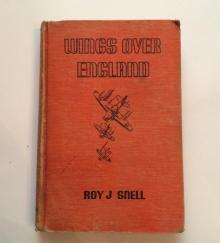 Wings over England
Wings over England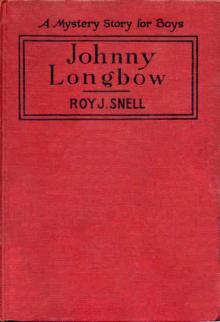 Johnny Longbow
Johnny Longbow Sally Scott of the WAVES
Sally Scott of the WAVES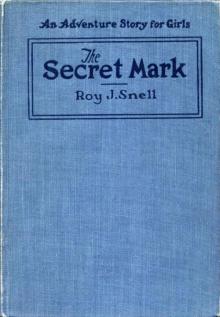 The Secret Mark
The Secret Mark Betty Leicester's Christmas
Betty Leicester's Christmas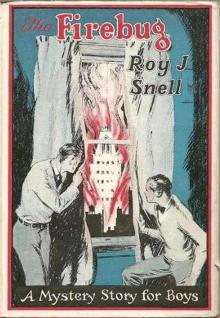 The Firebug
The Firebug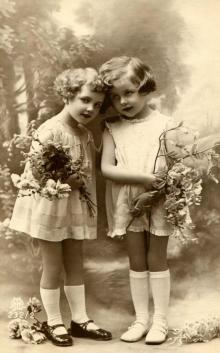 Minnie Brown; or, The Gentle Girl
Minnie Brown; or, The Gentle Girl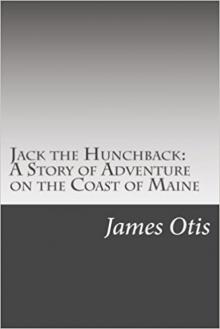 Jack the Hunchback: A Story of Adventure on the Coast of Maine
Jack the Hunchback: A Story of Adventure on the Coast of Maine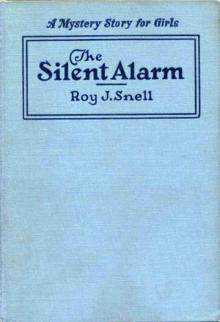 The Silent Alarm
The Silent Alarm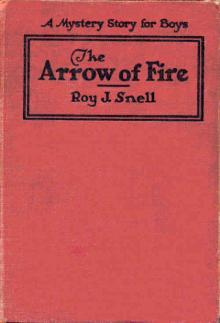 The Arrow of Fire
The Arrow of Fire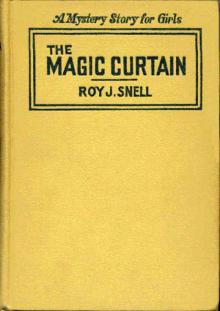 The Magic Curtain
The Magic Curtain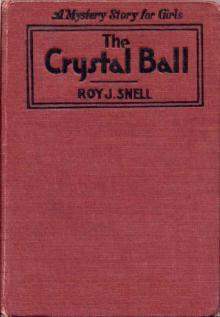 The Crystal Ball
The Crystal Ball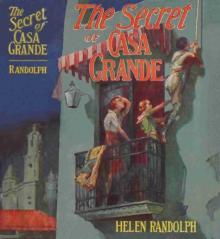 The Secret of Casa Grande
The Secret of Casa Grande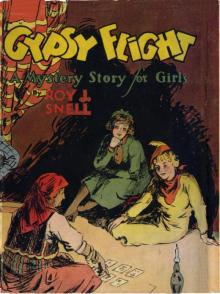 Gypsy Flight
Gypsy Flight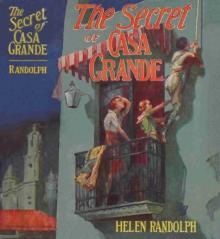 The Mystery of Carlitos
The Mystery of Carlitos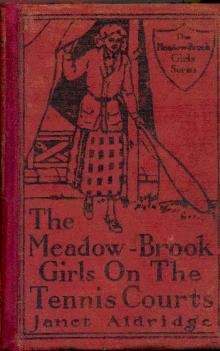 The Meadow-Brook Girls on the Tennis Courts; Or, Winning Out in the Big Tournament
The Meadow-Brook Girls on the Tennis Courts; Or, Winning Out in the Big Tournament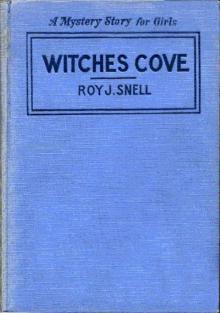 Witches Cove
Witches Cove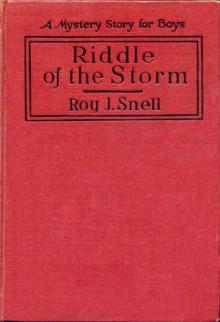 Riddle of the Storm
Riddle of the Storm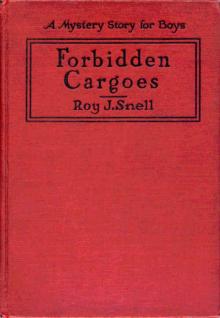 Forbidden Cargoes
Forbidden Cargoes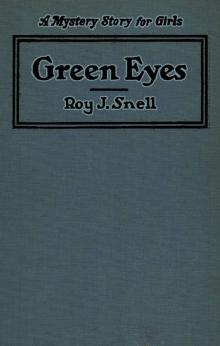 Green Eyes
Green Eyes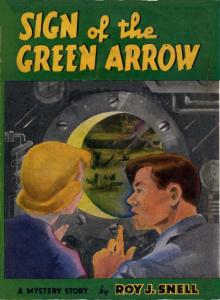 Sign of the Green Arrow
Sign of the Green Arrow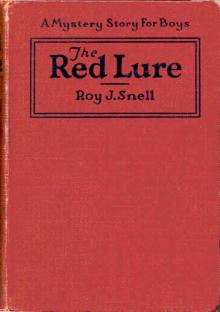 The Red Lure
The Red Lure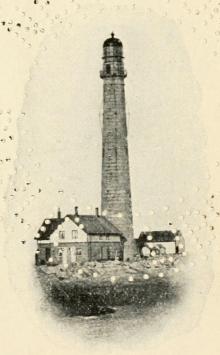 The Light Keepers: A Story of the United States Light-house Service
The Light Keepers: A Story of the United States Light-house Service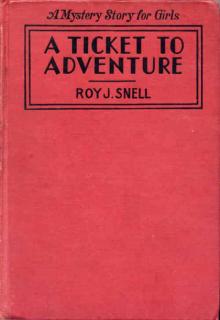 A Ticket to Adventure
A Ticket to Adventure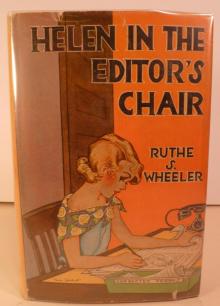 Helen in the Editor's Chair
Helen in the Editor's Chair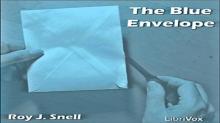 Blue Envelope
Blue Envelope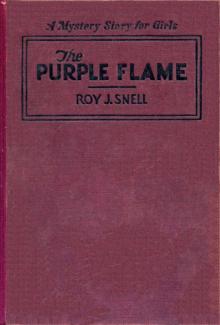 The Purple Flame
The Purple Flame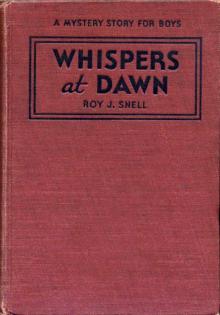 Whispers at Dawn; Or, The Eye
Whispers at Dawn; Or, The Eye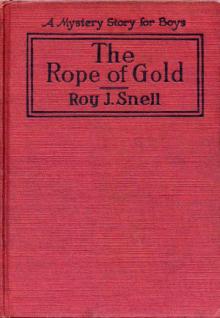 The Rope of Gold
The Rope of Gold Crossed Trails in Mexico
Crossed Trails in Mexico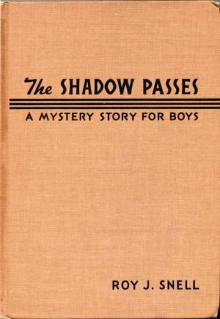 The Shadow Passes
The Shadow Passes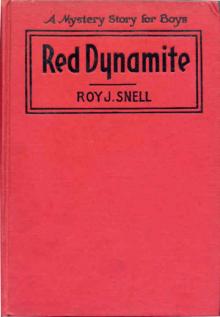 Red Dynamite
Red Dynamite Blue Grass Seminary Girls on the Water
Blue Grass Seminary Girls on the Water The Cruise of the O Moo
The Cruise of the O Moo